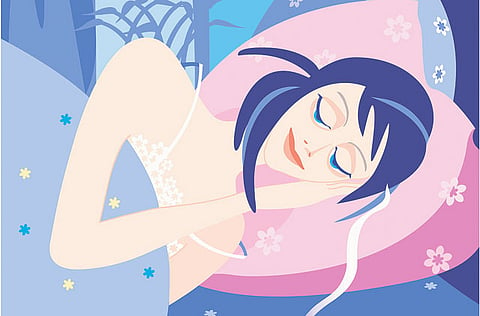It's a girl thing
Hormonal changes could be the reason why women experience more vivid dreams than men

Last night I was on a steam train, going to boarding school while, at the same time and with a growing sense of panic, I was trying to bake a loaf of bread. I knew I didn't have enough time for the loaf to rise and the stress was getting to me.
By the time I woke up from this, my most recent dream, my heart was racing and I felt breathless.
Dreams like this aren't a rare occurrence — my dreams are regularly vivid, colourful and panic-inducing. Some are one-offs while others are repeated over and over again. I often dream I'm searching for something in an old, crumbling house or discovering abandoned rooms in my childhood home. Occasionally, the dreams will become nightmares, featuring bereavement, murder or terrifying chases up spiral staircases.
By contrast, my husband tends to have dreams so dull he either doesn't remember them, or recounts gems such as: "I was waiting to buy a new printer cartridge and the receptionist told me to take a seat." Thrilling stuff. However, it seems our experiences are pretty typical.
"Women tend to experience a wider variety of dreams than men," explains dream researcher Professor Kelly Bulkeley, co-author of Dreaming In The Classroom. "Women have more nightmares, more emotional dreams, more surreal ones and greater trouble sleeping."
The chemical connection
Interestingly, research suggests that one key to women's vivid night-time experiences could be our hormones. "Research has shown female hormonal cycles can affect dreams," says Davina Mackail, author of The Dream Whisperer. "We tend to have more emotional or nightmarish dreams just before a period."
A study from the University of the West of England suggests changes in female body temperature, caused by the monthly cycle, are at the root of particularly colourful dreams. Body temperature rises after ovulation and drops just before a period.
"Women who are premenstrual tend to dream more aggressively, and are more likely to remember the dreams," says study leader Dr Jennie Parker.
Not surprisingly, pregnancy also leads to exceptionally vivid dreams. "During pregnancy, hormone levels rise and women find themselves spending a greater part of each night in REM sleep, which is when vivid dreaming takes place," says Victoria Dawson, sleep expert and co-author of Insomnia: The Essential Guide.
"Pregnancy has a big impact on dreaming," Bulkeley agrees. "There's more dream recall, more images involving animals and water, and more nightmares."
But it's not just pregnant women who are affected by nightmares. "We found that all women reported more nightmares than men," Dr Parker says.
"Only 19 per cent of men reported recent nightmares, compared with 30 per cent of women," she adds.
We may even be better at remembering dreams. "It's because women talk about them more afterwards," Bulkeley says.
"Traits such as openness to new experience, emotional expressiveness and sensitivity also tend to be higher among women, and are all connected with dream recall.
"Women are trained to be more attentive to emotional experience than men, and more willing to share their feelings with other people," Bulkeley adds.
It all sounds so positive — if only it was just a case of us lying back and enjoying the dream-movie ride. But our hectic subconscious seemingly affects our exhaustion levels during the day, too. A Vitality Show report found that more than half of women regularly feel exhausted and 60 per cent of over-30s feel "shattered".
So while our psychedelic dreams may sometimes be entertaining, it would help if we could choose whether to have them. But if you've tried everything and are still plagued with dreams of someone chasing you down the street or aircraft crashes, take comfort from the fact that dreaming is essential — and even beneficial.
What's more, there's always the chance your vivid dreams will allow you to experience your waking fantasies more fully.
"I once dreamt about an attractive, married colleague," admits my friend Sarah. "It was the most wonderful dream. The only problem was, I couldn't look him in the eye for weeks afterwards, and he had no idea what the problem was."
That's the thing with vivid dreams. They may be terrifying, scary, enjoyable or incredible — but they rarely come true.


